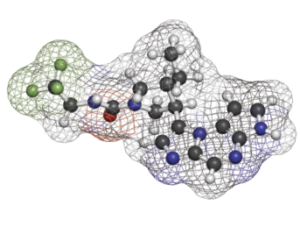
StudioMolekuul / shutterstock.com
As treatments for psoriatic arthritis (PsA) emerge, a clinical trial comparing the Janus kinase (JAK) inhibitor upadacitinib and the tumor necrosis factor (TNF) inhibitor adalimumab provided some new insights. Published earlier this year in The New England Journal of Medicine, the SELECT-PsA 1, double-blind, phase 3 trial found that a 30 mg dose of upadacitinib was superior to adalimumab—and a 15 mg dose of upadacitinib was non-inferior to adalimumab—but that more adverse events occurred with upadacitinib than with placebo.1
McInnes et al. also found the percentage of patients with PsA who had an ACR20 response at week 12 was significantly higher with the use of upadacitinib in 15 mg or 30 mg doses compared with placebo. All patients in the trial had an inadequate response to, or intolerable side effects with, nonbiologic disease-modifying anti-rheumatic drugs (DMARDs).
Adalimumab is already approved to treat PsA and rheumatoid arthritis. A 15 mg dose of upadacitinib was approved this year in the European Union for PsA, but has not yet been approved in the U.S. for PsA. And in September, the U.S. Food & Drug Administration (FDA) said it will require revisions to the Boxed Warning for JAK inhibitors to include information about the risks of serious heart-related events, lymphomas and lung cancer, blood clots and death.2 The FDA recommended reserving these medications for patients with an insufficient response, or intolerance, to one or more TNF blockers.
Study Details
The 24-week trial included 1,704 patients who received a drug or placebo. The global trial took place at 281 sites in 45 countries beginning in April 2017. Patients were assigned in a 1:1:1:1 ratio to receive either 15 mg or 30 mg of oral upadacitinib once daily, placebo or 40 mg of subcutaneous adalimumab every two weeks.
Patients in the trial had received a PsA diagnosis and had historical or current plaque psoriasis. They had three or more swollen joints and at least three tender joints. They also had one or more erosions on the hands or feet on radiography or a high-sensitivity C-reactive protein level higher than the lab-defined upper limit of the normal range.
Patients could receive non-steroidal anti-inflammatory drugs (NSAIDs), glucocorticoids and up to two nonbiologic DMARDs. Exclusion criteria included previous exposure to biologic therapies or JAK inhibitors.
Trial randomization was grouped by the extent of psoriasis (greater than 3% or less than 3% of the body surface area), current or non-use of one or more nonbiologic DMARDs, the presence or absence of dactylitis, and the presence or absence of enthesitis.
The primary end point was an ACR20 response (i.e., 20% or greater decrease in the number of tender or swollen joints and 20% or greater improvement in at least three of five other domains) at week 12 with upadacitinib compared with placebo. Secondary trial end points included change from baseline in the Health Assessment Questionnaire-Disability Index score at week 12, the percentage of patients with a decrease from baseline of at least 75% on the Psoriasis Area and Severity Index, and score changes on a variety of other assessments.



